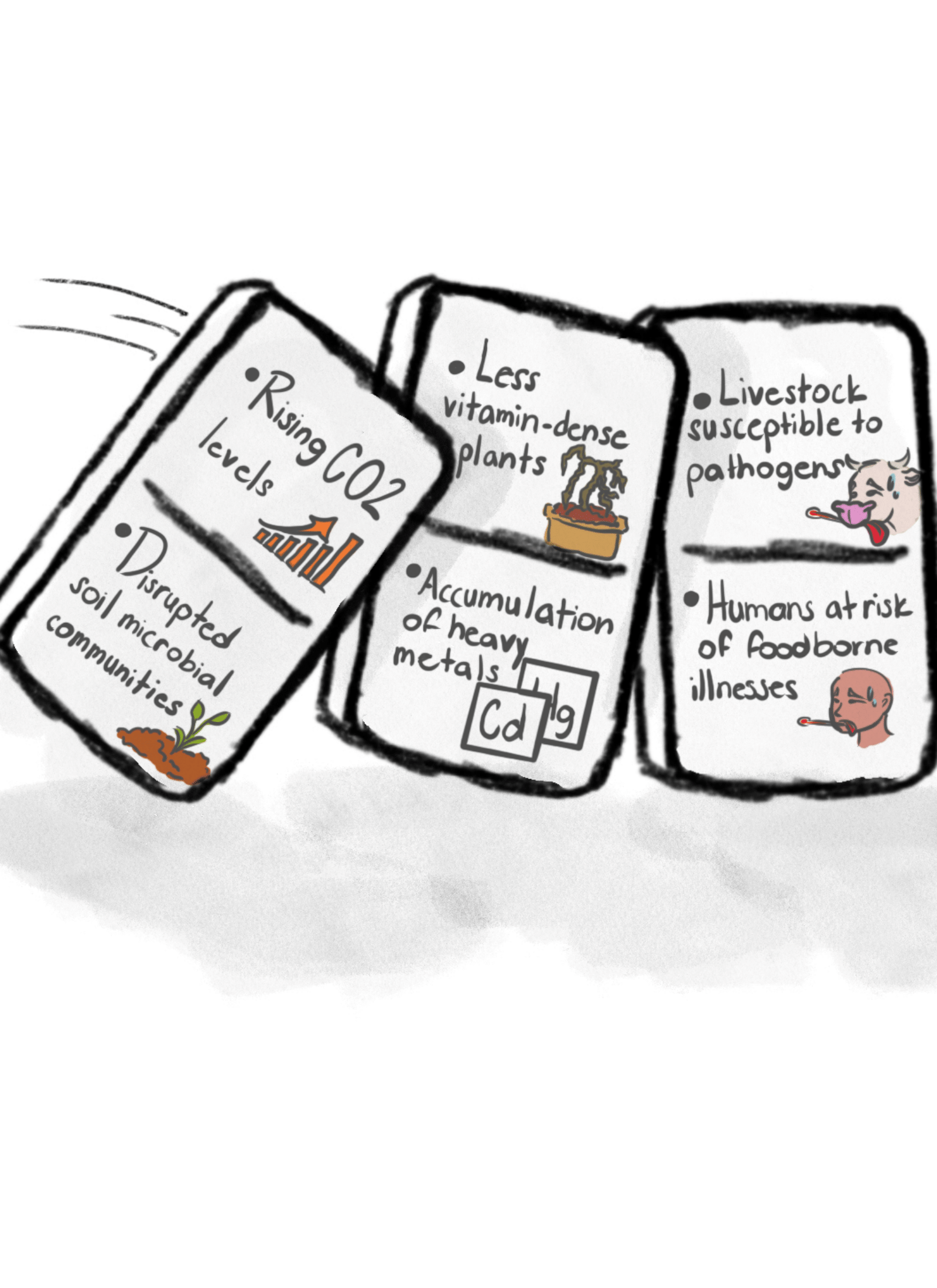What more can be done to bring urgency around climate change and its impending effects on our food systems? A growing desensitization to such dire news stagnates large-scale sustainable adjustments, and the masses are driven to acquire what is accessible but not necessarily viable.
There’s an apparent dissonance between product and consumer, a lack of connection a lot of us seem to have between our minds and our plates. Closing this chasm and producing more mindful eaters is vital to easing the pains being brought on by deteriorating atmospheric conditions.
Before exploring the avenues of becoming friendlier with our food, let’s take a look at what lurks and churns in the ravine we have facilitated and how it will only continue to aggregate unless we put a stop to the cycle.
Recent research highlights a potential decline in nutrient quality in produce due to rising CO2 levels impacting delicate microbial ecosystems. An increase in carbon content can disrupt proper nutrient cycling for plant life to absorb, creating less vitamin-dense harvests as the composition of microorganisms becomes warped (Owino et al., 2022). Protein content and vital nutrients, such as zinc and iron, become diluted as a result, indicating possible decreases in the bioavailability of nutrients (Fernando et al., 2012).
The potential for food degradation doesn’t stop there. Parallel to plants’ reaction to worsening soil, disordered nutrient composition in vegetation can result in tainted meat. Through bioaccumulation, plant life can culture contaminants from heavy metal air pollutants, such as Cadmium and Mercury (Gomes et al., 2021). In turn, increased vegetation toxicity could encourage susceptibility to pathogens that infect and contaminate animal tissue, ultimately contributing to an increase in foodborne illnesses among humans (Morber, 2019).
Like a line of dominoes, plants, animals, and people fall at the whims of global warming.
So is it entirely out of our hands? Experts don’t think so.
One possibility is returning to traditional agroecological practices. Indigenous communities of the Americas largely regulated the lands through calculated polycultural farming, motivated by their strong conservation-centered values. Although now long disrupted by colonization and overrun by an insistence on monocultural farming and GMO use, we still have a chance to refer back to indigenous knowledge and reinstate the widespread methods that once were.
Conducted by researchers in Mexico, an ecological case study investigating the efficacy of indigenous people’s farming methods within tropical forests found promising findings. When indigenous households in Plan de Hidalgo employed a diverse land-use strategy by combining home gardens, milpas (maize fields), cash-crop fields, potreros (cattle-raising fields), and vanilla groves, biodiversity was able to flourish, with milpas and home gardens being able to raise and host around 30 plant species each (Toledo et al., 2003). Although the research only focused on one case study and occurred over a relatively short period of three years, the Mexican Indigenous people of Plan de Hidalgo exhibited enduring and resilient land-use practices, showing consistent, sustained productivity by having a long-term perspective in mind.
However, drastically changing the fundamentals of modern farming en masse may not be feasible. Experts like scientist communicator and policy director of Biology Fortified, Anastasia Bodnar, believe the most effective route is making sustainability “sexy” to incentivize the masses and possibly making climate-resilient food alternatives more common in our diets by making them trendier (Morber, 2019).
One example of leveraging marketing trends and media influence to promote more mindful food choices includes “Meatless Mondays”, a prominent campaign initiated by The Monday Campaigns, which aims to reduce greenhouse gas emissions by around 2.4 million tons a year—the equivalent of taking 500,000 cars off the road annually (n.d.). University of Oxford’s Dr. Marco Springmann delved into the benefits of this “flexitarian” diet, highlighting its balanced and sustainable ways of improving nutrition, saving costs, and mitigating environmental impact (Springmann, 2021). Thanks to Springmann, the term “flexitarian” has received coverage in various outlets in recent years, including BBC, The Guardian, and The Telegraph, as many hop on the bandwagon of its trendiness to stay in style food-wise and better their dietary choices.
But while such campaigns may be more popular than indigenous ideals, will changes dependent on an individual basis be drastic enough to save us before it’s too late?
To truly get more personal with what’s on our plate, perhaps we need a balance between wisdom and fad to create the most quickly effective and sustainable results. By carefully referencing indigenous sustainability practices while also popularizing them through trendy means, we can navigate the challenges of climate change and ensure a future by capitalizing on the present system to honor the knowledge of the past.

References
Fernando, N., Panozzo, J., Tausz, M., Norton, R., Fitzgerald, G., & Seneweera, S. (2012). Rising atmospheric CO2 concentration affects mineral nutrient and protein concentration of wheat grain. Food Chemistry, 133(4), 1307–1311. https://doi.org/10.1016/j.foodchem.2012.01.105
Gomes, M. P., Pereira, E. G., Qiu, B.-S., & Juneau, P. (2021). Editorial: Coping with pollution – the effects of environmental contaminants on plant growth and physiology. Frontiers in Plant Science, 12, 740802. https://doi.org/10.3389/fpls.2021.740802
Jenny, M. (2019). As the planet warms, unusual crops could become climate saviors—If we’re willing to eat them. Ensia. https://ensia.com/features/climate-change-resilient-crops-plants-meat/
Owino, V., Kumwenda, C., Ekesa, B., Parker, M. E., Ewoldt, L., Roos, N., Lee, W. T., & Tome, D. (2022). The impact of climate change on food systems, diet quality, nutrition, and health outcomes: A narrative review. Frontiers in Climate, 4. https://www.frontiersin.org/articles/10.3389/fclim.2022.941842
Springmann, M., Clark, M. A., Rayner, M., Scarborough, P., & Webb, P. (2021). The global and regional costs of healthy and sustainable dietary patterns: A modelling study. The Lancet Planetary Health, 5(11), e797–e807. https://doi.org/10.1016/S2542-5196(21)00251-5
Toledo, V. M., Ortiz-Espejel, B., Cortés, L., Moguel, P., & Ordoñez, M. de J. (2003). The multiple use of tropical forests by indigenous peoples in mexico: A case of adaptive management. Conservation Ecology, 7(3). https://doi.org/10.5751/ES-00524-070309
The Monday Campaigns. (n.d.). Environmental research about meatless monday. https://www.mondaycampaigns.org/meatless-monday/research/environment
